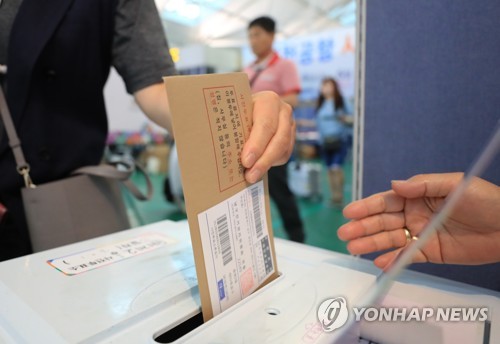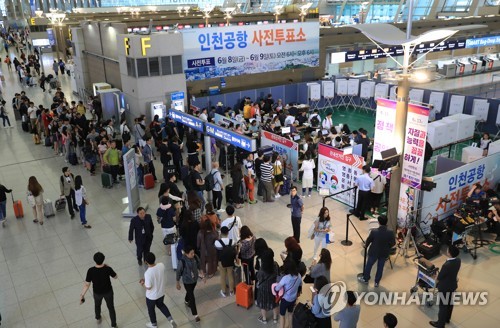About 3.8 million Koreans, or 8.77 percent of eligible voters, cast ballots Friday, the first of two days of early voting for the June 13 local elections, which are seen as an indicator of voter sentiment toward liberal President Moon Jae-in.
The advance voting was conducted at 3,512 polling stations nationwide from 6 a.m. to 6 p.m., according to the National Election Commission (NEC). The number of eligible voters for the elections is 42.9 million.
Up for grabs are 4,016 local administrative, legislative and educational posts, including 17 metropolitan mayors and provincial governors. The by-elections will be also held to fill 12 vacant parliamentary seats.
As of 6 p.m., turnout for the local elections was 8.77 percent, according to the election watchdog.
It was higher than 4.75 percent and 5.45 percent recorded on the first day of early voting for the 2014 local elections and 2016 general elections, respectively.
But it was lower than 11.7 percent logged during advance voting for the presidential election in May 2017.
The advance voting system was introduced for the by-elections in April 2013.
A poll released by the NEC showed Thursday that 76.5 percent of those surveyed said this week that they will definitely vote in the upcoming elections, up from 70.9 percent recorded two weeks earlier.
It said that 30.3 percent of those who intend to vote said they will cast ballots during the early voting.
"Early voting has taken root, not as just a backup tool but as one with almost the same weight as election day voting," said Yoon Hee-woong, an official at polling agency Opinion Live. "The final turnout could be higher than that for the 2014 local elections.

President Moon and his wife Kim Jung-sook cast their ballots earlier in the day, joined by a number of senior secretaries, including chief of staff Im Jong-seok.
Candidates running in the local elections, including Seoul Mayor Park Won-soon, also participated in the early voting.
Rival parties have been ramping up their campaigns to boost turnout for the early voting. Higher turnout in the advance voting usually leads to a higher voting rate on election day.
Recent polls show that the ruling Democratic Party (DP) is taking a sizable lead in both elections.
The DP has been basking in a high approval rating on the back of strong public support for President Moon and his drive for inter-Korean rapprochement.
A historic summit between U.S. President Donald Trump and North Korean leader Kim Jong-un slated for June 12 could be a boon for the liberal DP as hopes for peace remain high.
But the party has called for more participation in the early voting partly on concerns that young voters may skip the polls on the assumption that the DP will easily win.
"The June local polls are important elections in that voters' support will determine the success of the Moon Jae-in administration," the ruling party said in a statement.
In an effort to boost voting, the DP earlier said that, if the early voting turnout surpasses 20 percent, five of its female lawmakers will have their hairs dyed blue. If turnout for next week's elections tops 60 percent, five male lawmakers will follow suit.
The main opposition Liberty Korea Party (LKP) is apparently encouraging more participation in the early voting in a bid to minimize the impact of the Trump-Kim summit on the local elections.
The local elections could be overshadowed by the summit, which will be held just one day before the polls.
The LKP is still reeling from low public support following last year's ousting of former President Park Geun-hye due to a corruption scandal. It is hoping that "shy" conservative voters will come out after keeping a low profile on political issues.
The biggest battleground is the capital Seoul, where 20 percent of the country's population of 52 million resides.
Incumbent Mayor Park Won-soon is far ahead of his rivals -- Kim Moon-soo of the LKP and Ahn Cheol-soo of the minor opposition Bareunmirae Party.
With five days to go before the local elections, it is still being speculated that Kim and Ahn may seek to reach a last-minute agreement to merge their candidacies, despite the low possibility of that happening.

In the Gyeonggi Province gubernatorial election, negative campaigns are in full swing targeting Lee Jae-myung of the DP, who is leading the race.
Lee's rival revealed that Lee is alleged to have maintained an extramarital relationship with an actress while pretending not to be married.
Another focal point is South Gyeongsang Province, a traditional conservative stronghold, as the campaign of gubernatorial frontrunner Kim Kyoung-soo of the DP has been complicated by an online opinion rigging scandal.
The scandal centers on allegations that Kim knew and communicated with a power blogger, known by the nickname Druking, who allegedly rigged online comments on news stories in a bid to sway public opinion on hot-button political issues.
Pre-election opinion polls show that Kim thus far appears not to have been affected by the scandal. (Yonhap)

